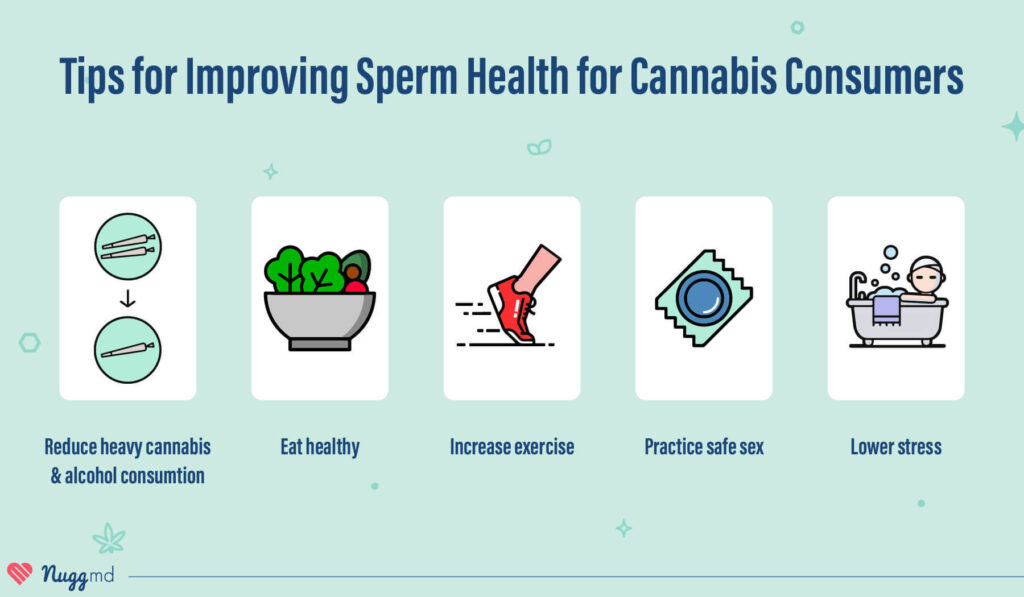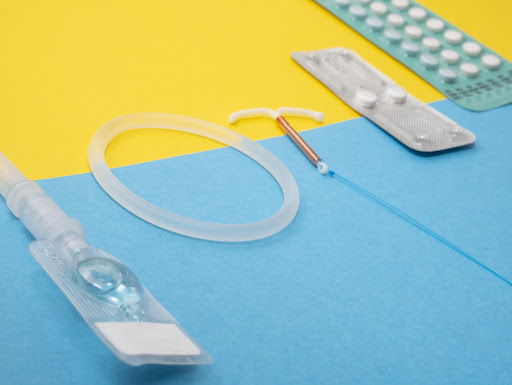Sometimes, cannabis usage may affect other biological components in our bodies. One of the most commonly asked questions is: does weed lower sperm count?
This article explores what the current research says about cannabis use and its potential effect on sperm health, including sperm count, physical characteristics, motility, and genetic makeup.
Does Weed Affect Sperm?
Based on current studies, there does appear to be a connection between cannabis consumption and sperm. Most of those studies state further research is needed for a more in-depth understanding of how the two intersect.
While cannabis consumption does not appear to cause infertility, studies have shown that it can correlate with sperm quality, quantity, and mobility.
In 2018 a study was published that found little association between cannabis use and fertility.¹ The study was a lifestyle and behavior survey of 4,194 women, of which 1,125 were couples. Male participation in the survey was optional.
A 2019 retrospective review found that most studies support the theory that marijuana consumption can influence sperm.² This includes potentially reducing sperm count and concentration as well as inducing and affecting motility, viability, and abnormalities. Researchers encourage further studies, especially to confirm that findings on animal samples will be the same as on humans. They also prompt doctors to consider sperm and fertility when discussing, considering, and prescribing cannabis usage.
Another research assessment done in 2020 found that although current studies consistently show negative associations between low sperm count and cannabis use, they often don’t account for factors like socioeconomic status and other drug use.³ These researchers acknowledge the limitations of subjects self-reporting and call for further studies to clarify the correlation between cannabis usage and sperm health.
It’s important to note that sperm morphology is generally not deeply understood, and abnormal sperm counts are not always related to an accurate predictor of fertility. Between 4-10% is the typical percentage of normal sperm found in a sample.⁴
Does Weed Lower Sperm Count

Research results are conflicting on how exactly cannabis affects sperm count. Many of these studies are small, focus on animal-trials, rely on self-reporting, or fail to account for external factors like subject’s mental health and economic factors. As a result, further study is recommended. However, as of 2022, most studies find cannabis consumption correlates with a reduced sperm count.
A very small study of 16 men in 1979 associated high doses of cannabis with reduced sperm count and concentration in 12 of them. 11 of the men had effects that lasted through the end of the study.⁵
In 2011 researchers administered cannabis orally to male mice for 36 consecutive days and found it was associated with suppressed sperm count.⁶
In 2015 a study was published that linked cannabis and other drug use more than one time a week within the previous three months to lower sperm concentration and sperm count and increased levels of testosterone.⁷ The study took place from 2008 to 2012 and surveyed 1,215 men aged 18-28 to determine their suitability for military service.
On the other hand, a study done at Harvard University collected over 1,000 samples of sperm over the course of over 15 years from 662 males experiencing fertility issues at the Massachusetts General Hospital. Compared to men who had never consumed cannabis, those that had were linked to having higher sperm concentration and count and lower levels of follicle-stimulating hormones (FSH), that stimulates the production of sperm. These researchers note that their study may not be suitable to apply to the general population and that the cases of cannabis consumption in their study were self-reported.⁸
From these reports, it is clear that cannabis consumption may be linked to sperm count, but it is unclear exactly how. Although low sperm count reduces the chances of pregnancy, it does not mean that sperm of cannabis consumers are abnormal or incapable of fertilizing an egg.
Does Weed Affect the Size and Shape of Sperm?
Yes, the abnormal size and shape, or morphology, of sperm has consistently been linked to cannabis usage in both humans and animals.
In 1979 researchers treated mice⁹ and rats¹⁰ with cannabis and found cannabis was associated with higher levels of abnormal sperm morphology. The same was found to be true in humans during the same year.¹¹
A survey of 409 men experiencing fertility issues was published in 2021 and found that 174 had used or were currently using cannabis. That study linked cannabis usage, along with other factors like tobacco use and Body Mass Index (BMI), to negative effects on sperm morphology.¹²
Abnormal sperm morphology has been linked to issues with fertility and, in some cases, infertility. How exactly cannabis plays a role in that expression is unclear, however, and further study is required.
A study from 2012 looked at the differences in the expression of the endocannabinoid system (ECS) in sperm in fertile versus infertile men. Traditional factors of sperm concentration, motility, and morphology did not necessarily predict fertility. However, the expression of different receptors of the ECS had clear differences between fertile and infertile men, which researchers emphasized as an important finding to encourage further study of the ECS and how it intersects with sperm morphology and male fertility.¹³
Can Weed Impact Sperm Motility?
Sperm motility refers to the movement of the sperm; it determines their ability to move through the female reproductive tract to fertilize the egg. Poor motility in sperm can be one factor linked to issues with fertility.
Research findings have often been able to link reduced or lower sperm motility to cannabis use.
The 1979 study of 16 men, the 2011 study on male mice, and the 2021 study of 409 men (all cited in previous sections of this article) each linked reduced sperm motility to cannabis consumption.¹⁴ ¹⁵ ¹⁶
A study of 78 males in 2006 divided sperm into the best and poor potential for fertilizing an egg. After exposing samples to delta-9-tetrahydrocannabinol (THC), both showed a decrease in motility.¹⁷
Can Weed Affect the Genetic Makeup of Sperm?
Data on the genetic makeup of sperm and how it intersects with cannabis use is extremely limited and remains unclear.¹⁸
Normal sperm cells contain 23 of the 46 chromosomes that make up genetic DNA. Early research found little effect on the DNA found in sperm.¹⁹
More recently, one group of researchers found that exposure to cannabis was associated with the methylation, or the way a gene expresses itself, of DNA in both rats and humans.²⁰ Some of those same researchers continued their studies and found a specific protein, Discs-Large Associated Protein 2 (DLGAP2), which is associated with autism, was influenced by THC exposure in rats. They also linked methylation of DLGAP2 to the fathers of rats who had been exposed to THC.²¹ This may mean there is a connection to inherited cannabis-exposed DNA.
They went on to study how refraining from cannabis usage would affect DNA methylation and found that abstinence from cannabis was associated with fewer instances of sperm showing mutations to gene expression.²²
All of their findings note the limitations of other lifestyle factors playing a role in the genetic expression of sperm exposed to cannabis. For example, researchers continued to find that the same genes affected by THC were also affected by nicotine.²³
Further research is needed to better understand how cannabis exposure in males is associated with changes in DNA gene expression.
How to Improve Sperm Health for Cannabis Users

While cannabis use appears to be linked to sperm health, exactly how sperm is affected remains difficult to pinpoint. There are some habits that can be changed or added to a routine to promote healthy sperm production in cannabis consumers.
- Reduce or stop cannabis use²⁴
- Reduce or stop alcohol consumption.
- Eat healthy
- Exercise
- Monitor and reduce stress levels – Stress levels are known to affect hormone levels.
- Practice safe sex – Some sexually transmitted infections (STIs), like gonorrhea, can cause infertility.
When Should You See a Doctor?
Some researchers use sperm quality as a distinct factor in the overall health and wellness of men because poor-quality semen has been linked with other health problems.
If you are concerned about cannabis usage or exposure to cannabis affecting the quality, quantity, or effectiveness of your or your partner's sperm and fertility, consult with your doctor as soon as possible. Especially if the male is over 35 and no conception has occurred after one year of sex without contraceptives.
Conclusion
Although morphology, vitality, and count and concentration are all factors that can affect the overall sperm health and fertility ability, they are all not always associated with one another. For example, abnormal sperm morphology and low sperm count do not always lead to infertility (though it may take more attempts to result in pregnancy).
There are still mixed and unclear findings as to exactly how cannabis affects the quality of sperm. It has, however, been made clear that cannabis is one of the few modifiable factors that is continuously linked to changes in the quality of sperm.²⁵ This includes the morphology, vitality, motility, and genetic makeup of the sperm.
Exactly how these factors and cannabis consumption are connected is where continued research will remain beneficial.
The best way to ensure good healthy sperm is to practice healthy lifestyle habits like exercise, eating well, and reducing stress. Sometimes this also may include reducing or refraining from cannabis consumption as well. However, individuals using cannabis medicinally should consider consulting with their doctor before reducing their dosage or frequency of consumption.
Sources
¹ Wise, Lauren A, et al. “Marijuana Use and Fecundability in a North American Preconception Cohort Study.” Journal of Epidemiology and Community Health, vol. 72, no. 3, 22 Dec. 2017, pp. 208–215, 10.1136/jech-2017-209755. Accessed 5 June 2022.
² Payne, Kelly S., et al. “Cannabis and Male Fertility: A Systematic Review.” The Journal of Urology, vol. 202, no. 4, 1 Oct. 2019, pp. 674–681, www.ncbi.nlm.nih.gov/pubmed/30916627, 10.1097/JU.0000000000000248.
³ Dubovis, Marina, and Ozgul Muneyyirci-Delale. “Effects of Marijuana on Human Reproduction.” Reproductive Toxicology, Apr. 2020, 10.1016/j.reprotox.2020.04.071. Accessed 19 Apr. 2020.
⁴ Helo, M.D, Sevann. “Abnormal Sperm Morphology: What Does It Mean?” Mayo Clinic, 2018, www.mayoclinic.org/diseases-conditions/male-infertility/expert-answers/sperm-morphology/faq-20057760.
⁵ Hembree, W. C., et al. “CHANGES in HUMAN SPERMATOZOA ASSOCIATED with HIGH DOSE MARIHUANA SMOKING.” ScienceDirect, Pergamon, 1 Jan. 1979, www.sciencedirect.com/science/article/pii/B978008023759650038X. Accessed 22 Oct. 2022
⁶ Banerjee, Arnab, et al. “Effects of Chronic Bhang (Cannabis) Administration on the Reproductive System of Male Mice.” Birth Defects Research Part B: Developmental and Reproductive Toxicology, vol. 92, no. 3, June 2011, pp. 195–205, 10.1002/bdrb.20295. Accessed 29 Jan. 2020.
⁷ Gundersen, Tina Djernis, et al. “Association between Use of Marijuana and Male Reproductive Hormones and Semen Quality: A Study among 1,215 Healthy Young Men.” American Journal of Epidemiology, vol. 182, no. 6, 16 Aug. 2015, pp. 473–481, 10.1093/aje/kwv135.
⁸ Hembree, W. C., et al. “CHANGES in HUMAN SPERMATOZOA ASSOCIATED with HIGH DOSE MARIHUANA SMOKING.” ScienceDirect, Pergamon, 1 Jan. 1979, www.sciencedirect.com/science/article/pii/B978008023759650038X. Accessed 22 Oct. 2022.
⁹ Zimmerman, ARTHUR M., et al. “EFFECTS of CANNABINOIDS on SPERMATOGENESIS in MICE.” ScienceDirect, Pergamon, 1 Jan. 1979, www.sciencedirect.com/science/article/pii/B9780080237596500366.
¹⁰ Huang, HOSEA F. S., et al. “EFFECTS of MARIHUANA INHALATION on SPERMATOGENESIS of the RAT.” ScienceDirect, Pergamon, 1 Jan. 1979, www.sciencedirect.com/science/article/pii/B9780080237596500378. Accessed 22 Oct. 2022.
¹¹ Hembree, W. C., et al. “CHANGES in HUMAN SPERMATOZOA ASSOCIATED with HIGH DOSE MARIHUANA SMOKING.” ScienceDirect, Pergamon, 1 Jan. 1979, www.sciencedirect.com/science/article/pii/B978008023759650038X. Accessed 22 Oct. 2022.
¹² Hehemann, Marah C., et al. “Evaluation of the Impact of Marijuana Use on Semen Quality: A Prospective Analysis.” Therapeutic Advances in Urology, vol. 13, Jan. 2021, p. 175628722110324, 10.1177/17562872211032484.
¹³ Lewis, Sheena E. M., et al. “Differences in the Endocannabinoid System of Sperm from Fertile and Infertile Men.” PloS One, vol. 7, no. 10, 2012, p. e47704, pubmed.ncbi.nlm.nih.gov/23082196/, 10.1371/journal.pone.0047704. Accessed 21 Oct. 2021.
¹⁴ Hembree, W. C., et al. “CHANGES in HUMAN SPERMATOZOA ASSOCIATED with HIGH DOSE MARIHUANA SMOKING.” ScienceDirect, Pergamon, 1 Jan. 1979, www.sciencedirect.com/science/article/pii/B978008023759650038X. Accessed 22 Oct. 2022.
¹⁵ Banerjee, Arnab, et al. “Effects of Chronic Bhang (Cannabis) Administration on the Reproductive System of Male Mice.” Birth Defects Research Part B: Developmental and Reproductive Toxicology, vol. 92, no. 3, June 2011, pp. 195–205, 10.1002/bdrb.20295. Accessed 29 Jan. 2020.
¹⁶ Hehemann, Marah C., et al. “Evaluation of the Impact of Marijuana Use on Semen Quality: A Prospective Analysis.” Therapeutic Advances in Urology, vol. 13, Jan. 2021, p. 175628722110324, 10.1177/17562872211032484.
¹⁷ Whan, Lynne B., et al. “Effects of Delta-9-Tetrahydrocannabinol, the Primary Psychoactive Cannabinoid in Marijuana, on Human Sperm Function in Vitro.” Fertility and Sterility, vol. 85, no. 3, Mar. 2006, pp. 653–660, 10.1016/j.fertnstert.2005.08.027. Accessed 26 Jan. 2022.
¹⁸ Schrott, Rose, and Susan K Murphy. “Cannabis Use and the Sperm Epigenome: A Budding Concern?” Environmental Epigenetics, vol. 6, no. 1, 1 Jan. 2020, 10.1093/eep/dvaa002.
¹⁹ Huang, HOSEA F. S., et al. “EFFECTS of MARIHUANA INHALATION on SPERMATOGENESIS of the RAT.” ScienceDirect, Pergamon, 1 Jan. 1979, www.sciencedirect.com/science/article/pii/B9780080237596500378. Accessed 22 Oct. 2022.
²⁰ Murphy, Susan K., et al. “Cannabinoid Exposure and Altered DNA Methylation in Rat and Human Sperm.” Epigenetics, vol. 13, no. 12, 2 Dec. 2018, pp. 1208–1221, 10.1080/15592294.2018.1554521. Accessed 27 Sept. 2021.
²¹ Schrott, Rose, et al. “Cannabis Use Is Associated with Potentially Heritable Widespread Changes in Autism Candidate Gene DLGAP2 DNA Methylation in Sperm.” Epigenetics, vol. 15, no. 1-2, 26 Aug. 2019, pp. 161–173, 10.1080/15592294.2019.1656158. Accessed 19 June 2021.
²² “Refraining from Use Diminishes Cannabis-Associated Epigenetic Changes in Human Sperm.” Environmental Epigenetics, vol. 7, no. 1, 1 Sept. 2021, 10.1093/eep/dvab009. Accessed 30 Sept. 2022.
²³ “Sperm DNA Methylation Altered by THC and Nicotine: Vulnerability of Neurodevelopmental Genes with Bivalent Chromatin.” Scientific Reports, vol. 10, no. 1, 29 Sept. 2020, 10.1038/s41598-020-72783-0. Accessed 15 Oct. 2020.
²⁴ “Refraining from Use Diminishes Cannabis-Associated Epigenetic Changes in Human Sperm.” Environmental Epigenetics, vol. 7, no. 1, 1 Sept. 2021, 10.1093/eep/dvab009. Accessed 30 Sept. 2022.
²⁵ Pacey, A. A., et al. “Modifiable and Non-Modifiable Risk Factors for Poor Sperm Morphology.” Human Reproduction, vol. 29, no. 8, 4 June 2014, pp. 1629–1636, 10.1093/humrep/deu116. Accessed 3 June 2019.
The information in this article and any included images or charts are for educational purposes only. This information is neither a substitute for, nor does it replace, professional legal advice or medical advice, diagnosis, or treatment. If you have any concerns or questions about laws, regulations, or your health, you should always consult with an attorney, physician or other licensed professional.




